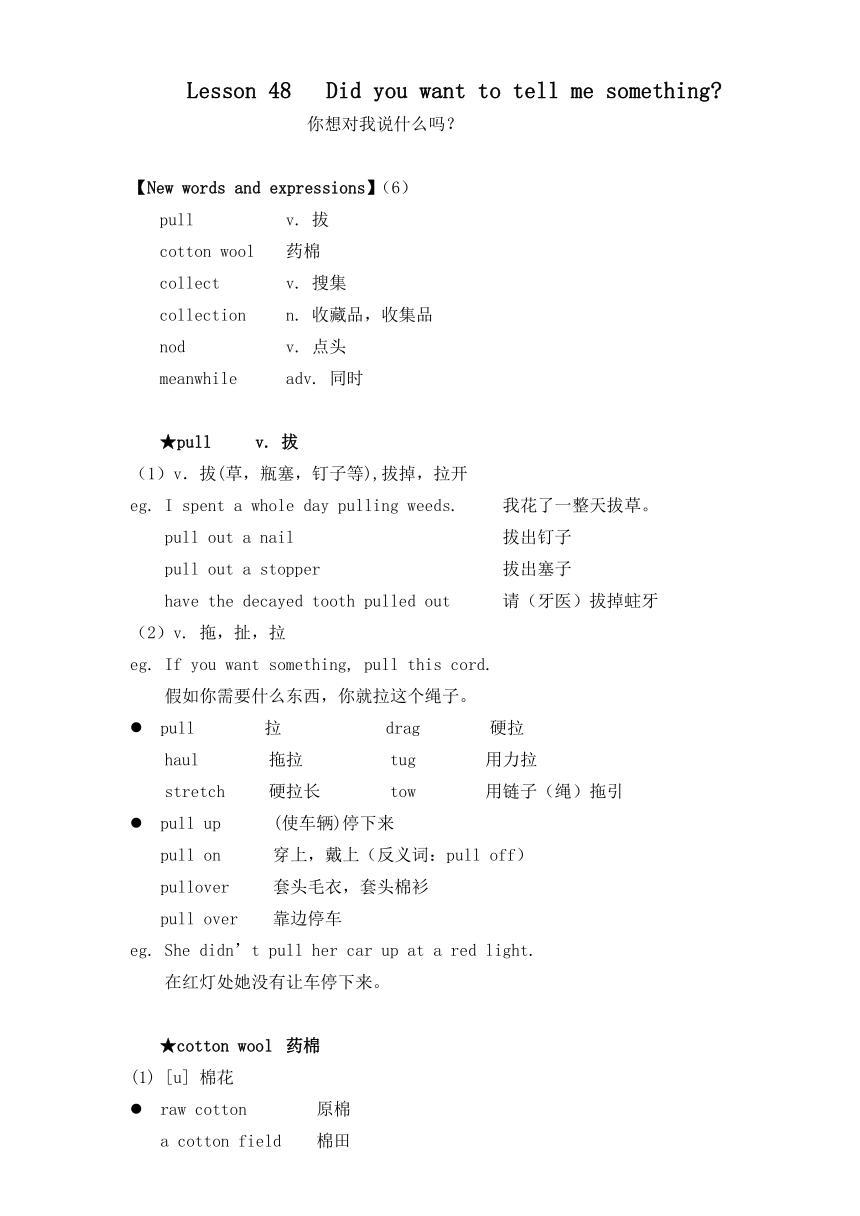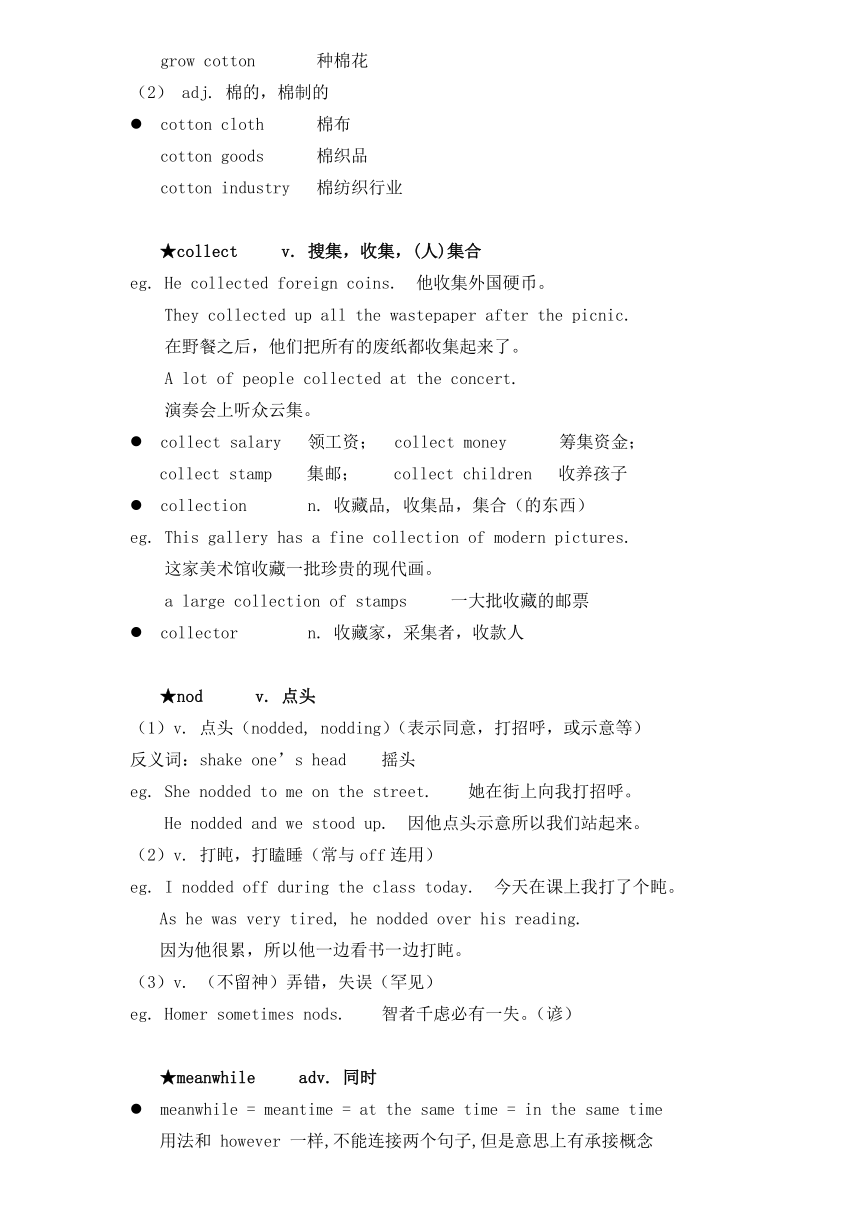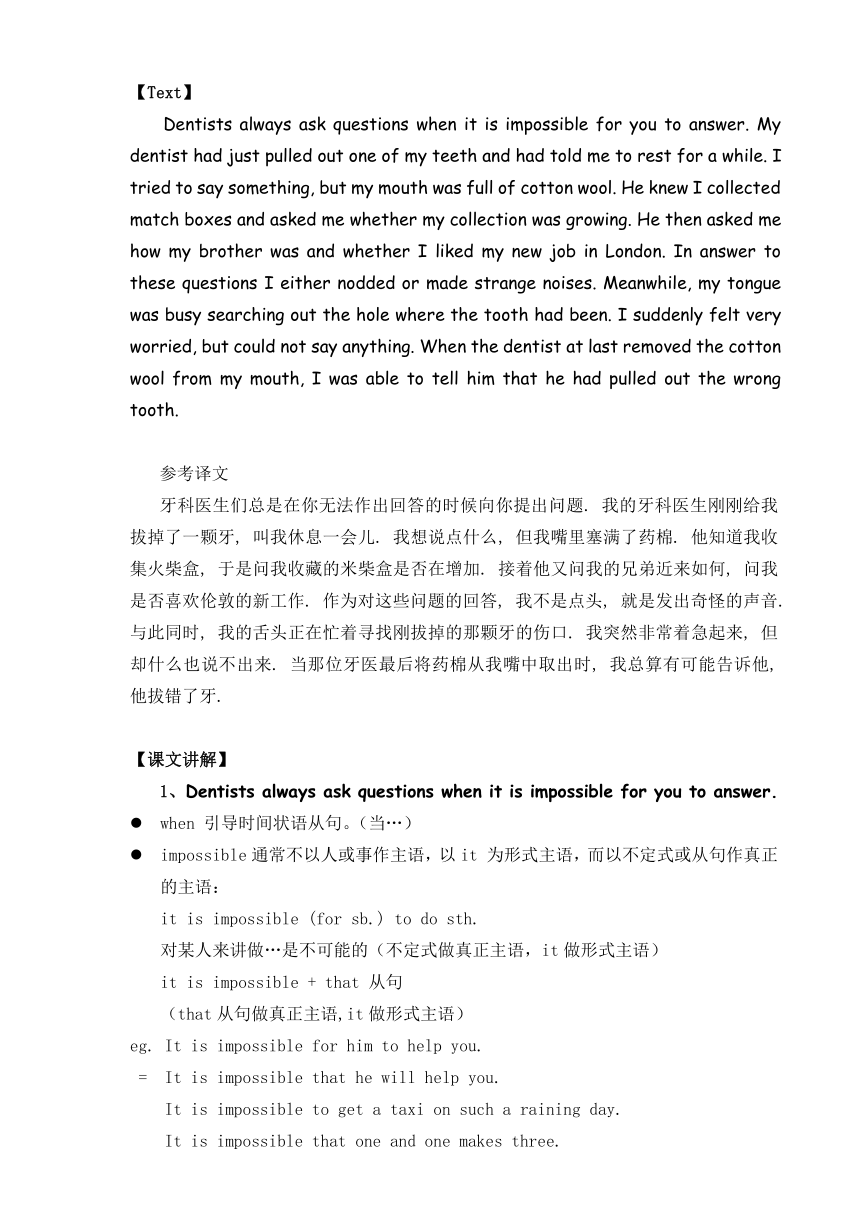新概念英语二册超详教案讲义笔记Lesson 48 Did you want to tell me something 你想对我说什么吗?
文档属性
| 名称 | 新概念英语二册超详教案讲义笔记Lesson 48 Did you want to tell me something 你想对我说什么吗? |  | |
| 格式 | docx | ||
| 文件大小 | 27.8KB | ||
| 资源类型 | 教案 | ||
| 版本资源 | 新概念英语 | ||
| 科目 | 英语 | ||
| 更新时间 | 2023-09-26 06:58:03 | ||
图片预览



文档简介
Lesson 48 Did you want to tell me something
你想对我说什么吗?
【New words and expressions】(6)
pull v. 拔
cotton wool 药棉
collect v. 搜集
collection n. 收藏品,收集品
nod v. 点头
meanwhile adv. 同时
★pull v. 拔
(1)v.拔(草,瓶塞,钉子等),拔掉,拉开
eg. I spent a whole day pulling weeds. 我花了一整天拔草。
pull out a nail 拔出钉子
pull out a stopper 拔出塞子
have the decayed tooth pulled out 请(牙医)拔掉蛀牙
(2)v. 拖,扯,拉
eg. If you want something, pull this cord.
假如你需要什么东西,你就拉这个绳子。
pull 拉 drag 硬拉
haul 拖拉 tug 用力拉
stretch 硬拉长 tow 用链子(绳)拖引
pull up (使车辆)停下来
pull on 穿上,戴上(反义词:pull off)
pullover 套头毛衣,套头棉衫
pull over 靠边停车
eg. She didn’t pull her car up at a red light.
在红灯处她没有让车停下来。
★cotton wool 药棉
(1) [u] 棉花
raw cotton 原棉
a cotton field 棉田
grow cotton 种棉花
(2) adj. 棉的,棉制的
cotton cloth 棉布
cotton goods 棉织品
cotton industry 棉纺织行业
★collect v. 搜集,收集,(人)集合
eg. He collected foreign coins. 他收集外国硬币。
They collected up all the wastepaper after the picnic.
在野餐之后,他们把所有的废纸都收集起来了。
A lot of people collected at the concert.
演奏会上听众云集。
collect salary 领工资; collect money 筹集资金;
collect stamp 集邮; collect children 收养孩子
collection n. 收藏品, 收集品,集合(的东西)
eg. This gallery has a fine collection of modern pictures.
这家美术馆收藏一批珍贵的现代画。
a large collection of stamps 一大批收藏的邮票
collector n. 收藏家,采集者,收款人
★nod v. 点头
(1)v. 点头(nodded, nodding)(表示同意,打招呼,或示意等)
反义词:shake one’s head 摇头
eg. She nodded to me on the street. 她在街上向我打招呼。
He nodded and we stood up. 因他点头示意所以我们站起来。
(2)v. 打盹,打瞌睡(常与off连用)
eg. I nodded off during the class today. 今天在课上我打了个盹。
As he was very tired, he nodded over his reading.
因为他很累,所以他一边看书一边打盹。
(3)v. (不留神)弄错,失误(罕见)
eg. Homer sometimes nods. 智者千虑必有一失。(谚)
★meanwhile adv. 同时
meanwhile = meantime = at the same time = in the same time
用法和 however 一样,不能连接两个句子,但是意思上有承接概念
【Text】
Dentists always ask questions when it is impossible for you to answer. My dentist had just pulled out one of my teeth and had told me to rest for a while. I tried to say something, but my mouth was full of cotton wool. He knew I collected match boxes and asked me whether my collection was growing. He then asked me how my brother was and whether I liked my new job in London. In answer to these questions I either nodded or made strange noises. Meanwhile, my tongue was busy searching out the hole where the tooth had been. I suddenly felt very worried, but could not say anything. When the dentist at last removed the cotton wool from my mouth, I was able to tell him that he had pulled out the wrong tooth.
参考译文
牙科医生们总是在你无法作出回答的时候向你提出问题. 我的牙科医生刚刚给我拔掉了一颗牙, 叫我休息一会儿. 我想说点什么, 但我嘴里塞满了药棉. 他知道我收集火柴盒, 于是问我收藏的米柴盒是否在增加. 接着他又问我的兄弟近来如何, 问我是否喜欢伦敦的新工作. 作为对这些问题的回答, 我不是点头, 就是发出奇怪的声音. 与此同时, 我的舌头正在忙着寻找刚拔掉的那颗牙的伤口. 我突然非常着急起来, 但却什么也说不出来. 当那位牙医最后将药棉从我嘴中取出时, 我总算有可能告诉他, 他拔错了牙.
【课文讲解】
1、Dentists always ask questions when it is impossible for you to answer.
when 引导时间状语从句。(当…)
impossible通常不以人或事作主语,以it 为形式主语,而以不定式或从句作真正的主语:
it is impossible (for sb.) to do sth.
对某人来讲做…是不可能的(不定式做真正主语,it做形式主语)
it is impossible + that 从句
(that从句做真正主语,it做形式主语)
eg. It is impossible for him to help you.
= It is impossible that he will help you.
It is impossible to get a taxi on such a raining day.
It is impossible that one and one makes three.
= It is impossible for one and one to make three.
一加一等于三是不可能的。
此外,it 也可不做主语,而做宾语。
eg. Illness made it impossible for him to go.(√)
Illness made him impossible to go.(×)
2、My dentist had just pulled out one of my teeth and had told me to rest for a while.
teeth(pl.) – tooth 牙齿
told me to rest for a while. (tell sb. to do sth.告诉某人去做某事)
3、I tried to say something, but my mouth was full of cotton wool.
tried to say something (try to do sth. 尝试做某事)
be full of = be filled with 充满,塞满
4、He knew I collected match boxes and asked me whether my collection was growing.
He knew I collected match boxes. 宾语从句
(其中collect match boxes作宾语)
asked me whether my collection was growing 宾语从句
(其中whether my collection was growing作宾语)
5、He then asked me how my brother was and whether I liked my new job in London.
then
那时,当时
eg. I lived in the country then. 那时我住在乡下。
然后,而后,其次
eg. I dropped in at her house and then went home.
我去拜访了一下他的家然后回家了。
那么(常置于句首或句尾)
eg. What do you think of that, then 那么你怎么想呢?
Then what shall we do? 那么我们该怎么做呢?
He then asked me how my brother was.
(特殊疑问句改间接引语)(宾语从句)
改成直接引语: He then asked, “how is your brother ”
and whether I liked my new job in London.
(一般疑问句改间接引语) (宾语从句)
改成直接引语: “Do you like your new job ”
6、In answer to these questions I either nodded or made strange noises.
in answer to… 作为对……的回答;响应……的请求
eg. In answer to my request, he wrote a letter to George.
应我的请求,他给乔治写了封信。
answer back 顶嘴(口)
in return for 作为对……的报答 (L:6)
either nodded or made strage noises
either … or … (两者之中)或者…或者…
(连接语法结构相同的单词、短语或从句等。后面连接主语时,谓语动词与最近的主语保持一致。)
eg. Either you or I am wrong. 或者你或者我错了。
neither … nor … 既不 … 也不 …
eg. He can speak neither Japanese nor English.
= He can’t speak either Japanese or English.
either (二者之中)任何一方都不(否定句中)
eg. There is no post office on either side of the street.
either adj./pron. 两方的,任何一个的(肯定句)
eg. There were benches on either side of the hall.
在大厅任何一侧都有长椅。
Either of the cars will do. 两辆车都行。
(of后接复数名词时,名词前加the, my等修饰词)
7、Meanwhile, my tongue was busy searching out the hole where the tooth had been.
meanwihile 在此期间,与此同时
eg. He won’t come until ten o’clock. Meanwhile you can have a rest.
be busy doing sth. 忙于做某事
eg. She is busy preparing for supper. 她忙着做晚饭。
search out 找出,搜出
eg. Have you searched out the books I needed
where = 介词 + which
eg. That is the house which I lived in. 这是我住的房子
= That is the house where I lived.
(where称为关系副词,另外还有when也是关系副词)
hole n. 洞,坑
8、I suddenly felt very worried, but could not say anything.
could not say anything = could say nothing 什么也说不出来
9、When the dentist at last removed the cotton wool from my mouth, I was able to tell him that he had pulled out the wrong tooth.
remove可以表示“拿去,除去,去掉”,通常结构为“remove +名词 +from”,也可以单独使用:
eg. I’ve removed that picture from the wall.
Please remove your hat.
你想对我说什么吗?
【New words and expressions】(6)
pull v. 拔
cotton wool 药棉
collect v. 搜集
collection n. 收藏品,收集品
nod v. 点头
meanwhile adv. 同时
★pull v. 拔
(1)v.拔(草,瓶塞,钉子等),拔掉,拉开
eg. I spent a whole day pulling weeds. 我花了一整天拔草。
pull out a nail 拔出钉子
pull out a stopper 拔出塞子
have the decayed tooth pulled out 请(牙医)拔掉蛀牙
(2)v. 拖,扯,拉
eg. If you want something, pull this cord.
假如你需要什么东西,你就拉这个绳子。
pull 拉 drag 硬拉
haul 拖拉 tug 用力拉
stretch 硬拉长 tow 用链子(绳)拖引
pull up (使车辆)停下来
pull on 穿上,戴上(反义词:pull off)
pullover 套头毛衣,套头棉衫
pull over 靠边停车
eg. She didn’t pull her car up at a red light.
在红灯处她没有让车停下来。
★cotton wool 药棉
(1) [u] 棉花
raw cotton 原棉
a cotton field 棉田
grow cotton 种棉花
(2) adj. 棉的,棉制的
cotton cloth 棉布
cotton goods 棉织品
cotton industry 棉纺织行业
★collect v. 搜集,收集,(人)集合
eg. He collected foreign coins. 他收集外国硬币。
They collected up all the wastepaper after the picnic.
在野餐之后,他们把所有的废纸都收集起来了。
A lot of people collected at the concert.
演奏会上听众云集。
collect salary 领工资; collect money 筹集资金;
collect stamp 集邮; collect children 收养孩子
collection n. 收藏品, 收集品,集合(的东西)
eg. This gallery has a fine collection of modern pictures.
这家美术馆收藏一批珍贵的现代画。
a large collection of stamps 一大批收藏的邮票
collector n. 收藏家,采集者,收款人
★nod v. 点头
(1)v. 点头(nodded, nodding)(表示同意,打招呼,或示意等)
反义词:shake one’s head 摇头
eg. She nodded to me on the street. 她在街上向我打招呼。
He nodded and we stood up. 因他点头示意所以我们站起来。
(2)v. 打盹,打瞌睡(常与off连用)
eg. I nodded off during the class today. 今天在课上我打了个盹。
As he was very tired, he nodded over his reading.
因为他很累,所以他一边看书一边打盹。
(3)v. (不留神)弄错,失误(罕见)
eg. Homer sometimes nods. 智者千虑必有一失。(谚)
★meanwhile adv. 同时
meanwhile = meantime = at the same time = in the same time
用法和 however 一样,不能连接两个句子,但是意思上有承接概念
【Text】
Dentists always ask questions when it is impossible for you to answer. My dentist had just pulled out one of my teeth and had told me to rest for a while. I tried to say something, but my mouth was full of cotton wool. He knew I collected match boxes and asked me whether my collection was growing. He then asked me how my brother was and whether I liked my new job in London. In answer to these questions I either nodded or made strange noises. Meanwhile, my tongue was busy searching out the hole where the tooth had been. I suddenly felt very worried, but could not say anything. When the dentist at last removed the cotton wool from my mouth, I was able to tell him that he had pulled out the wrong tooth.
参考译文
牙科医生们总是在你无法作出回答的时候向你提出问题. 我的牙科医生刚刚给我拔掉了一颗牙, 叫我休息一会儿. 我想说点什么, 但我嘴里塞满了药棉. 他知道我收集火柴盒, 于是问我收藏的米柴盒是否在增加. 接着他又问我的兄弟近来如何, 问我是否喜欢伦敦的新工作. 作为对这些问题的回答, 我不是点头, 就是发出奇怪的声音. 与此同时, 我的舌头正在忙着寻找刚拔掉的那颗牙的伤口. 我突然非常着急起来, 但却什么也说不出来. 当那位牙医最后将药棉从我嘴中取出时, 我总算有可能告诉他, 他拔错了牙.
【课文讲解】
1、Dentists always ask questions when it is impossible for you to answer.
when 引导时间状语从句。(当…)
impossible通常不以人或事作主语,以it 为形式主语,而以不定式或从句作真正的主语:
it is impossible (for sb.) to do sth.
对某人来讲做…是不可能的(不定式做真正主语,it做形式主语)
it is impossible + that 从句
(that从句做真正主语,it做形式主语)
eg. It is impossible for him to help you.
= It is impossible that he will help you.
It is impossible to get a taxi on such a raining day.
It is impossible that one and one makes three.
= It is impossible for one and one to make three.
一加一等于三是不可能的。
此外,it 也可不做主语,而做宾语。
eg. Illness made it impossible for him to go.(√)
Illness made him impossible to go.(×)
2、My dentist had just pulled out one of my teeth and had told me to rest for a while.
teeth(pl.) – tooth 牙齿
told me to rest for a while. (tell sb. to do sth.告诉某人去做某事)
3、I tried to say something, but my mouth was full of cotton wool.
tried to say something (try to do sth. 尝试做某事)
be full of = be filled with 充满,塞满
4、He knew I collected match boxes and asked me whether my collection was growing.
He knew I collected match boxes. 宾语从句
(其中collect match boxes作宾语)
asked me whether my collection was growing 宾语从句
(其中whether my collection was growing作宾语)
5、He then asked me how my brother was and whether I liked my new job in London.
then
那时,当时
eg. I lived in the country then. 那时我住在乡下。
然后,而后,其次
eg. I dropped in at her house and then went home.
我去拜访了一下他的家然后回家了。
那么(常置于句首或句尾)
eg. What do you think of that, then 那么你怎么想呢?
Then what shall we do? 那么我们该怎么做呢?
He then asked me how my brother was.
(特殊疑问句改间接引语)(宾语从句)
改成直接引语: He then asked, “how is your brother ”
and whether I liked my new job in London.
(一般疑问句改间接引语) (宾语从句)
改成直接引语: “Do you like your new job ”
6、In answer to these questions I either nodded or made strange noises.
in answer to… 作为对……的回答;响应……的请求
eg. In answer to my request, he wrote a letter to George.
应我的请求,他给乔治写了封信。
answer back 顶嘴(口)
in return for 作为对……的报答 (L:6)
either nodded or made strage noises
either … or … (两者之中)或者…或者…
(连接语法结构相同的单词、短语或从句等。后面连接主语时,谓语动词与最近的主语保持一致。)
eg. Either you or I am wrong. 或者你或者我错了。
neither … nor … 既不 … 也不 …
eg. He can speak neither Japanese nor English.
= He can’t speak either Japanese or English.
either (二者之中)任何一方都不(否定句中)
eg. There is no post office on either side of the street.
either adj./pron. 两方的,任何一个的(肯定句)
eg. There were benches on either side of the hall.
在大厅任何一侧都有长椅。
Either of the cars will do. 两辆车都行。
(of后接复数名词时,名词前加the, my等修饰词)
7、Meanwhile, my tongue was busy searching out the hole where the tooth had been.
meanwihile 在此期间,与此同时
eg. He won’t come until ten o’clock. Meanwhile you can have a rest.
be busy doing sth. 忙于做某事
eg. She is busy preparing for supper. 她忙着做晚饭。
search out 找出,搜出
eg. Have you searched out the books I needed
where = 介词 + which
eg. That is the house which I lived in. 这是我住的房子
= That is the house where I lived.
(where称为关系副词,另外还有when也是关系副词)
hole n. 洞,坑
8、I suddenly felt very worried, but could not say anything.
could not say anything = could say nothing 什么也说不出来
9、When the dentist at last removed the cotton wool from my mouth, I was able to tell him that he had pulled out the wrong tooth.
remove可以表示“拿去,除去,去掉”,通常结构为“remove +名词 +from”,也可以单独使用:
eg. I’ve removed that picture from the wall.
Please remove your hat.
同课章节目录
